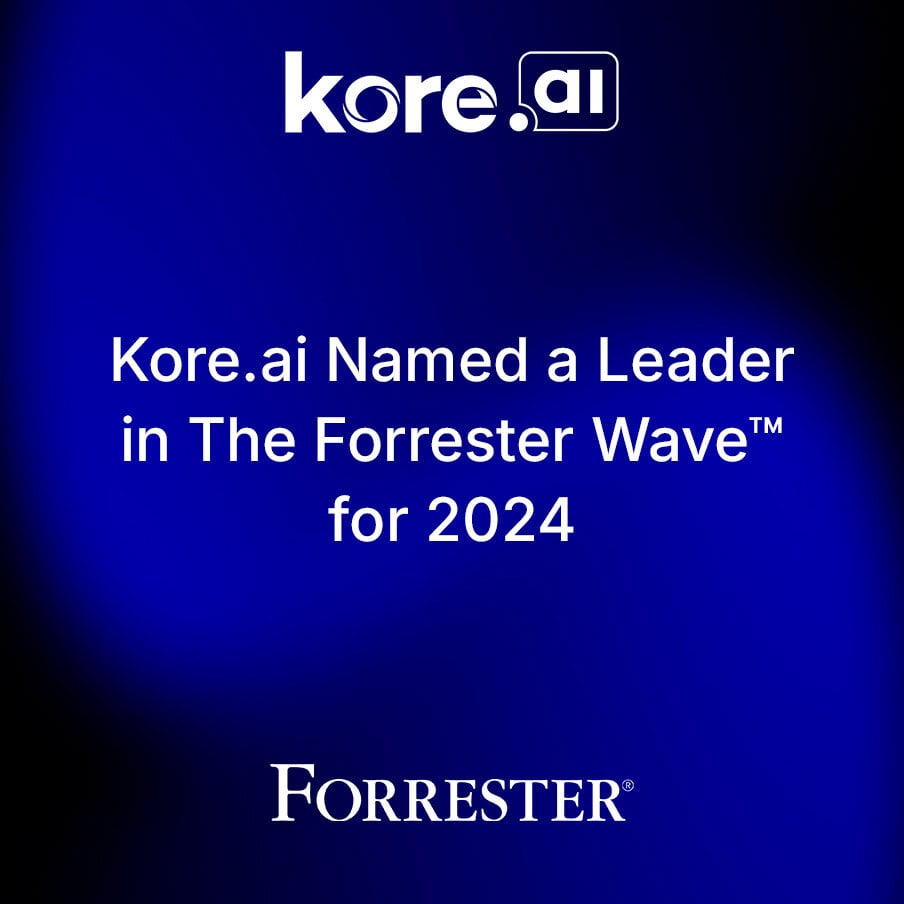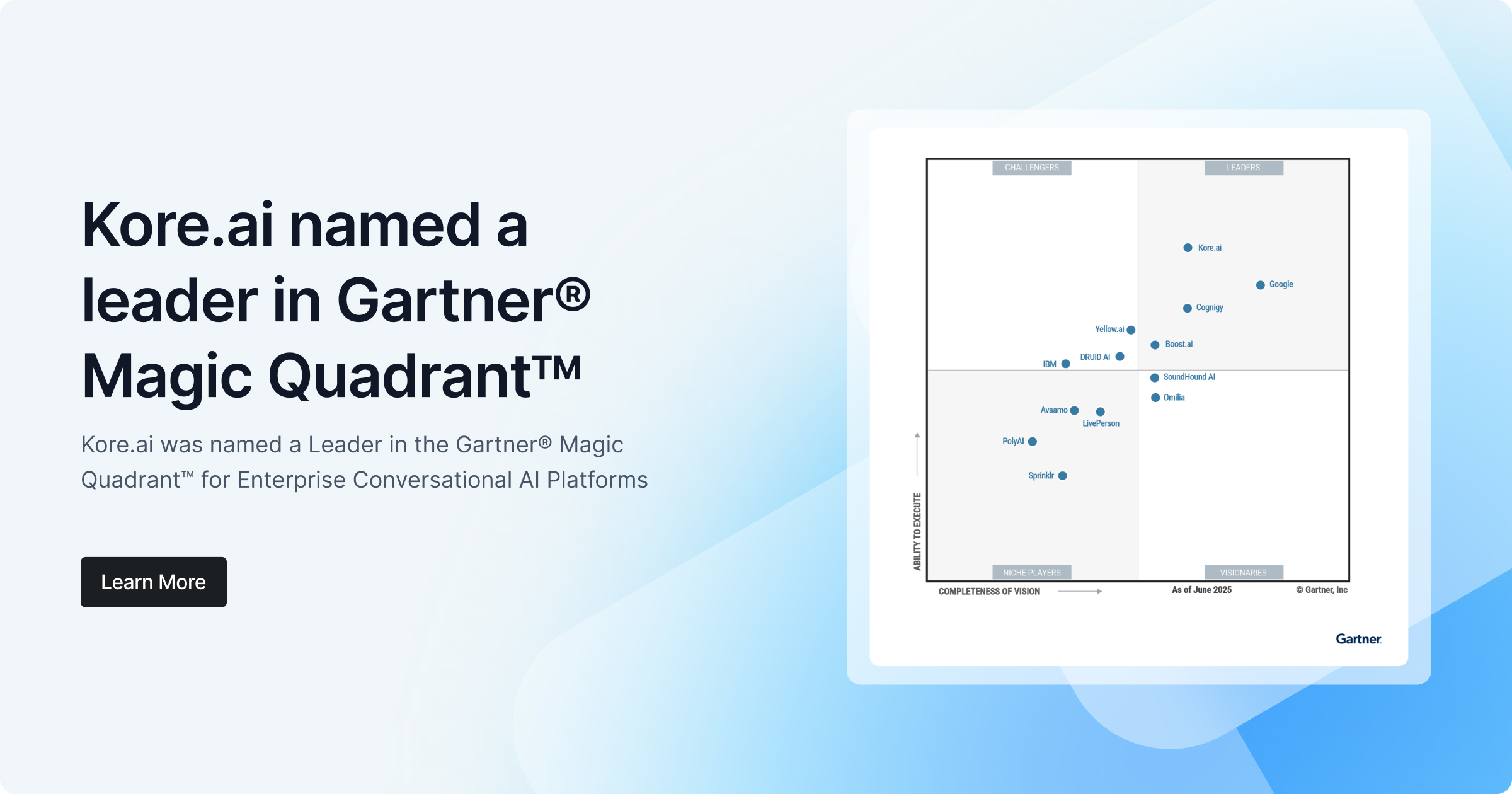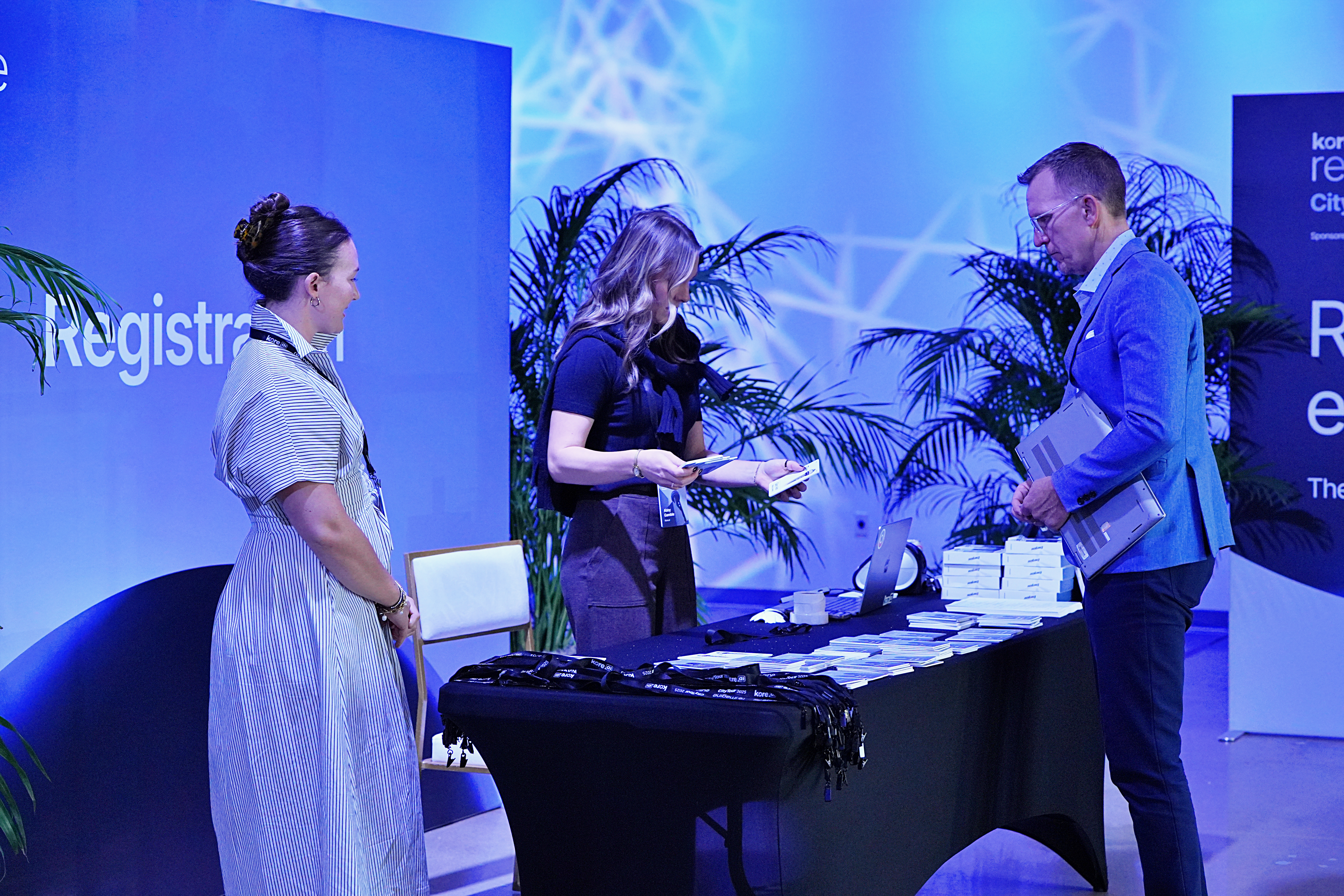For the third consecutive year, Kore.ai has been named a Leader in Everest Group's Conversational AI - Technology Vendor Landscape with Products PEAK Matrix Assessment. The 2022 assessment compares 26 leading global conversational AI solution providers, highlights the key strengths of each vendor, and segregates them into categories like Leaders, Major Contenders, and Aspirants.
Kore.ai has been recognized as a 'Leader' based on its market impact, vision, and capabilities.
The assessment is the outcome of detailed interactions with conversational AI vendors, analysis of core capabilities, client references, and a thorough appraisal of market trends.
The Everest report makes a note of the growing market adoption of conversational AI technology based on a wide variety of factors. This includes the number of enterprises adopting these solutions, their scale of implementations, the diversity of customer base across industries, geographies, environments, and the enterprise size. What's propelling the momentum is the value that businesses derive through conversational AI, proven by their eagerness to put money where their mouth is when it comes to this emerging technology.
At the end of 2020, the total addressable global conversational AI market was valued at $5.78 billion. It is projected to demonstrate a CAGR of roughly 18.9% from 2021 until 2030, becoming a multi-billion vertical by touching $32.62 billion.

|
Commenting on Everest's recognition, Kore.ai CEO and Founder Raj Koneru said: "We are glad to have been featured in this report. Everest's latest research further substantiates that adopting AI-powered conversational solutions is rising across industries. The growing sophistication of cognitive AI, deep learning, and NLU is driving a much faster evolution and adoption of conversational AI solutions and platforms, with an increasing richness of enterprise-grade features. Our innovations and many industry-first implementations have significantly raised the bar for truly enterprise-grade conversational AI platforms." |
It's clear why businesses across all sectors have taken steps toward connecting with consumers on various digital and voice channels. In a survey of more than 5,000 consumers across major global markets, 77% say they're more likely to purchase from a company if they can browse or get personalized responses promptly over messaging.
Beyond automation, conversational AI is now used in some of the most sophisticated use cases. To name a few instances, these include multimodal visual IVR for insurance members' calls, surfing knowledge from vast pools of enterprise data, and helping large customer-facing organizations (like banks or retailers manage partner brand-specific responses in multiple languages).
The Kore.ai enterprise-grade, no-code platform is known as the Experience Optimization (XO) Platform. The platform enables business users, non-developers, and non-data scientists to leverage conversational AI technology to quickly build conversational user interfaces, virtual assistants, and process workflows for various use cases involving customer experience and employee experience.
Kore.ai also offers a growing portfolio of AI-first solutions such as SmartAssist, AgentAssist, BankAssist, HealthAssist, SearchAssist, WorkAssist, HR Assist, and IT Assist. These solutions are built on top of the platform and deployed on a subscription model basis to accelerate customer adoption and time-to-business based on their specific requirements.
Six factors that are driving this market are:
-
The Conversational AI Adoption Cycle is on an Upswing: Before COVID, there have been a lot of experiments with using conversational AI to design rudimentary, basic chatbots to try and address the most common use cases with the most significant being improving customer experience by automating customer service. This soon expanded into other enterprise areas such as HR support automation, IT service management, legal, procurement, finance support automation. This allows employees to send their questions and requests to a virtual assistant, whether this involves HR support automation, IT service management, legal, procurement or finance support automation.
New AI implementations deliver value in cost optimization, improved sales, agent augmentation, or better customer engagement across Marketing, Sales, and Retail. Today, most large enterprise clients are embarking on a transformational conversational AI journey with high-speed adoption rates. - he Conversational AI Space Will Prove to be Recession-Proof: With a fear of a global recession looming large over the economy worldwide in varying degrees and forms, having a solution that will set businesses up for success is a necessity. Even though the macroeconomic situation seems grave, most companies on the Global 2000 list seek to replace manual processes with automated, digital self-service for customers.
Companies during a recession are likely to pursue two objectives:
- Hold back unnecessary investments
- Accelerate investments that lead to short-term results
Conversational AI automates high cost functions such as customer service, IT support, or HR support and provides immediate results that add to the short-term benefits. With low upfront costs, companies are experiencing advantages in both the short and long term while reducing expenses, even with the probability of an economic depression.
- Reimagining Contact Centers: Large enterprises are seeing amazing results by leveraging platform providers like Kore.ai to automate repetitive processes like receiving voice calls, chats, emails, or social media messages. The automation routes the call/chat over to agents when needed and provides them with an AgentAssist bot to improve their agents’ productivity.
Before this, an enterprise running a call center had mundane, complex procedures that forced callers to go through long wait times and labyrinth style menu options causing high customer frustrations. With conversational AI, the bot can engage immediately with consumers in natural language, understand their needs, and respond automatically like any human agent would without the need for a live agent. This technology has allowed businesses to be more efficient and enables customers to feel more empowered and more engaged with the brand. - The Rising Tide of Voice Automation: Interest in voice automation has increased significantly over the last couple of years, so much so that the volume of voice is much higher than the volume of digital for most traditional companies. That's why large enterprise clients, who form 80% of our customer base, have adopted our platform for its ability to automate complex and personalized conversations and transactions in large volumes for both voice and digital channels.
- The Significance of Product-Led Growth (PLG): Kore.ai offers do-it-yourself (DIY) functionalities for driving AI adoption to empower small and medium businesses, startups, and the developer community. Through this initiative, developers and businesses worldwide can access the Kore.ai enterprise-grade XO platform with self-service options. This allows businesses to build next-gen, AI-powered solutions without a significant initial investment. PLG drives strategy in the SMB segment, where we expect more significant demand in the coming days.
Kore.ai has also formalized the learning process by offering certification through Kore.ai Academy and a library of rich templates for new developers to accelerate their IVA development journey.
-
Conversational AI as the Foundation of the Metaverse and Omniverse: Conversational AI will become the foundation for delivering positive, humanistic experiences in the Metaverse as it replaces the graphical interface of digital applications with a conversational interface.
For those use cases that lend themselves to the Metaverse over a period of time, virtual avatars will become the primary building blocks of digital reality. These virtual avatars - a virtual teller, virtual postman, or a virtual salesman -are all robots who will need to communicate conversationally to provide excellent customer service and support. If avatars are the basis of the Metaverse, then conversational AI is its engine.










